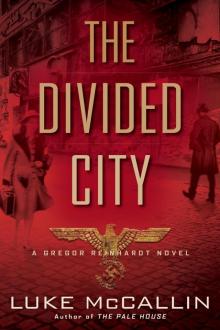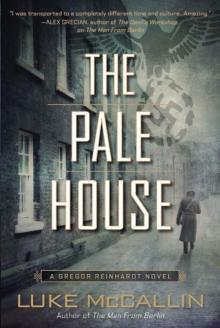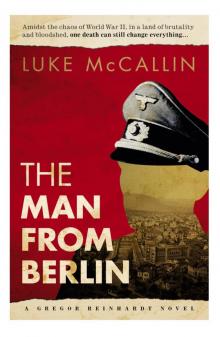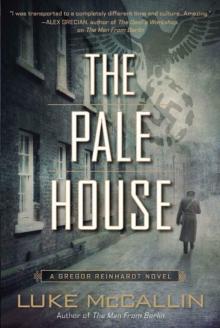- Home
- Luke McCallin
The Divided City
The Divided City Read online
PRAISE FOR
THE PALE HOUSE
“[A] well-executed sequel . . . Readers who can’t wait for Philip Kerr’s next Bernie Gunther novel will find much to like.”
—Publishers Weekly
“A multilayered tale of war, political upheaval, and fragile hope.”
—Kirkus Reviews
“A very engaging thriller series. Reinhardt is both tough and thoughtful, and it’s impossible not to get drawn into his emotional depths and root for him. The cast is full of sympathetic characters, the worst of villains, innocents, and everyone in between. The setting is engaging, the characters complicated, and the plot inspired.”
—Historical Novel Society
“A very compelling murder mystery that takes place in a seldom-talked-about country during WWII, and Mr. McCallin paints a vivid picture of Sarajevo, of the people, and [of] the dire conditions everyone had to endure.”
—Fresh Fiction
PRAISE FOR
THE MAN FROM BERLIN
“I’m reminded of Martin Cruz Smith in the way I was transported to a completely different time and culture and then fully immersed in it. An amazing first novel.”
—Alex Grecian, author of The Devil’s Workshop
“From page one, Luke McCallin draws the reader into a fascinating world of mystery, intrigue, and betrayal.”
—Charles Salzberg, author of Swann’s Lake of Despair
“Set in 1943 Sarajevo, McCallin’s well-wrought debut . . . highlights the complexities of trying to be an honest cop under a vicious, corrupt regime . . . Intelligent diversion for WWII crime fans.”
—Publishers Weekly
“An extraordinarily nuanced and compelling narrative.”
—New York Journal of Books
“Reinhardt’s character is compelling, as complex and conflicted as the powers that surround him . . . I look forward to the next Gregor Reinhardt mystery.”
—Historical Novel Society
Berkley Books by Luke McCallin
THE MAN FROM BERLIN
THE PALE HOUSE
THE DIVIDED CITY
BERKLEY
An imprint of Penguin Random House LLC
375 Hudson Street, New York, New York 10014
Copyright © 2016 by Luke McCallin
Penguin Random House supports copyright. Copyright fuels creativity, encourages diverse voices, promotes free speech, and creates a vibrant culture. Thank you for buying an authorized edition of this book and for complying with copyright laws by not reproducing, scanning, or distributing any part of it in any form without permission. You are supporting writers and allowing Penguin Random House to continue to publish books for every reader.
BERKLEY is a registered trademark and the B colophon is a trademark of Penguin Random House LLC.
Ebook ISBN 9780698407220
An application to register this book for cataloging has been sent to the Library of Congress
First Edition: December 2016
Cover photograph by Roman Vishniac: Woman walking past a demolished shoe store 1947 © Mara Vishniac Kohn, courtesy International Center of Photography; Man in trench coat © Trevillion Images
This is a work of fiction. Names, characters, places, and incidents either are the product of the author’s imagination or are used fictitiously, and any resemblance to actual persons, living or dead, business establishments, events, or locales is entirely coincidental.
Version_1
To my wife, Barbara, and my children, Liliane and Julien
ACKNOWLEDGMENTS
This one was a difficult one . . .
Many people helped me through the writing of this novel, with insights and support, with food and good cheer, or with just being there. My deepest thanks and affection to my family, above all, for living through the good times (there were a few, right?!) and the bad times (plenty of those!) as I wrestled with the plot and the writing and a rewarding but demanding full-time job.
Thanks to those who read the drafts and offered comments and advice. To my wife, Barbara, my parents, John and Margaret, and my sisters, Cassie and Amy. Thanks as well to friends and colleagues, in particular to Number One Fan (aka Marina Throne-Holst), Ben Negus, Séverine Rey, and Marina Konovalova, whose insights and comments into Russian and Soviet thinking were invaluable. Franz Boettcher helped out enormously with research on Berlin’s locations and infrastructure, and with German history, idioms, and culture. My cousin, Dominic Barrett, helped out with Russian drinking customs! Ion Mills at my British publishers, No Exit Press, was a reliable font of wisdom, good cheer, and culinary destinations in London. Thanks as always to Ryan and Tamara at Geneva Fitness for keeping the bar high; many’s the time I literally worked out frustrations with plot and character! A shout-out to the “dawn patrol” as well (you know who you are!). Lastly, I want in particular to acknowledge the contribution of Chelsea Starling, my friend and website designer extraordinaire, who insisted that Reinhardt had to have something to live for, that his life could not be all wrack and ruin. She was right.
My thanks to my editors, Tom Colgan and Amanda Ng, and to my agent, Peter Rubie, for keeping things on an even keel.
CONTENTS
Praise for Luke McCallin
Berkley Books by Luke McCallin
Title Page
Copyright
Dedication
Acknowledgments
Dramatis Personae
Part One: How Happy the Dead Chapter 1
Chapter 2
Chapter 3
Chapter 4
Chapter 5
Chapter 6
Part Two: By His Work Is a Craftsman Known Chapter 7
Chapter 8
Chapter 9
Chapter 10
Chapter 11
Chapter 12
Chapter 13
Chapter 14
Chapter 15
Chapter 16
Chapter 17
Chapter 18
Chapter 19
Chapter 20
Chapter 21
Chapter 22
Chapter 23
Chapter 24
Chapter 25
Part Three: The Only Blessing Wickedness Possesses Chapter 26
Chapter 27
Chapter 28
Chapter 29
Chapter 30
Chapter 31
Chapter 32
Chapter 33
Chapter 34
Chapter 35
Chapter 36
Chapter 37
Chapter 38
Chapter 39
Chapter 40
Part Four: All Guilt Avenged Chapter 41
Chapter 42
Chapter 43
Chapter 44
Chapter 45
Chapter 46
Chapter 47
Chapter 48
Part Five: The Devil Is Never So Black Chapter 49
Historical Note
About the Author
DRAMATIS PERSONAE
MAIN CHARACTERS
Reinhardt, Gregor Kripo detective, assigned to Schöneberg; a former officer in the German Army
Bliemeister, Bruno Assistant Chief of Police in the American sector
Bochmann, Heinrich Former executive officer of III./NJG64 (formerly IV./JG56)
Brauer, Rudolph Former pol
iceman; Reinhardt’s best friend and former partner in Kripo
Carlsen British agent, found murdered
Collingridge, David American official in the US occupation authorities
De Massigny, Armand French lieutenant and archivist, working in the WASt
Endres Professor of pathology at the Charité hospital complex
Ganz, Hugo Veteran Kripo detective in Schöneberg; a man of few loyalties
Gareis Former pilot in IV./JG56
Gieb A prostitute
Haber Former air force researcher and scientist
Jürgen Former pilot in IV./JG56
Kausch Former SS stürmbannfuhrer (major); a man with a past to hide
Lassen Kripo detective in Hamburg
Leyser, Marius Former Brandenburger (German commando)
Dr. Lütjens Former air force researcher and scientist
Margraff, Paul Berlin’s police president (chief of police), a German soldier captured at Stalingrad and now a Soviet collaborator
Markworth, James British official in the UK occupation authorities
Meissner, Hilde Widow of Tomas Meissner, Reinhardt’s former mentor
Neumann, Walter Chief of police in Schöneberg
Noell, Andreas Former pilot in IV./JG56
Noell, Theodor Former air force researcher and scientist
Ochs Superintendent of Noell’s building
Reinhardt, Friedrich Reinhardt’s son, a former Soviet prisoner of war
Semrau German official working in the WASt
Skokov Major in the Soviet MGB (state security)
Stresemann Allegedly Gieb’s pimp, wanted for Carlsen’s murder
Stucker Former pilot in IV./JG56
Tanneberger, Karl Chief of detectives in Schöneberg
Uthmann Tenant in Noell’s building
Von Vollmer, Claus Former commanding officer of III./NJG64 (formerly IV./JG56), now a businessman
Weber Kripo detective; a surly young man with an unknown past, often seen with detectives Frohnau and Schmidt
Whelan, Harry British official in the Allied Control Council
Zuleger Former pilot in IV./JG56
OTHER CHARACTERS (ELSEWHERE OR DECEASED PRIOR TO THIS STORY)
Albrecht, Fenski, Hauck, Meurer, Osterkamp, Prellberg, and Thurner Former pilots in IV./JG56
Vukić, Suzana A Yugoslav partisan
ORGANIZATIONS AND LOCATIONS
Allied Control Council The military-occupation governing body of the Allied Occupation Zones in Germany, composed of representatives from the US, USSR, UK, and France, located in the Kammergericht building in the US sector in Berlin
Berlin Document Center Central repository of documents relating to the Nazi Party and Nazism, instrumental in the formulation of war crimes investigations and proceedings. Located in Zehlendorf in the US sector
WASt Wehrmacht Information Office for War Losses and PoWs: the central repository for information on German servicemen, as well as German and Allied prisoners of war. Located in Reinickendorf in the French sector
PART ONE
How Happy the Dead
1
BERLIN, EARLY 1947
MONDAY
Reinhardt had come to prefer the nights.
The nights were when things felt cleaner, clearer. The nights were when his city could sometimes resemble something more than the shattered ruin it was. The nights were when he did not have to look down at the dust and grit that floured his shoes and trousers, the innards of his city turned out and spread wide for all to see. It was the days when Berlin emerged scarred and scorched into the light, when its people arose to chase their shadows through the day, wending their way from who knew where to who knew what beneath frowning escarpments of ruin and rubble, which humped up and away in staggered mounds of wreckage, and through which the roads seemed to wind like the dried-out bottoms of riverbeds.
It was very early on a Monday morning when the call came in, a body in a stairwell in an apartment building in the American sector of Berlin, down in Neukölln. These were bad hours by anyone’s reckoning, the hours no one wanted, the hours married men were curled up asleep with their wives, the single men with their girls, when even drunks found a corner to sleep it off. They were the hours those on the chief’s blacklist worked. They were the hours they gave the probationers—those too new to the force to maneuver themselves a better shift—or those too old but who had nowhere to go.
Reinhardt knew he was closer to the second category than to the first. But however those hours were counted by others, he considered them his best, when it was quiet and he could have the squad room all but to himself, or else wander the darkened streets and avenues, winding his way past the avalanche slides of brick and debris, learning the new architecture the war had gouged across Berlin’s façades. He and his city were strangers to each other, he knew. They had moved on in different ways, and these night hours—these witching hours, when he would sometimes chase the moon across the city’s jagged skyline, spying it through the rents and fissures deep within buildings, watching the play of light and shadow in places it should never have been seen—were what he needed to rediscover it, what it was, and what had become of it.
All this, though, was in the back of his mind as the ambulance followed the dull glow of its headlights down a road swept clear along its middle, pocked and pitted with shell craters and tears in its surface, a suggestion of looming ruin to either side. He spotted the building up ahead, the fitful yellow beams of flashlights wobbling yolk-like in its entrance and casting the shadows of people up the walls and out into the street. He climbed stiffly out of the ambulance, switching on his own flashlight as he turned up the channel cleared between the rubble. He paused. He swung the flashlight at the entrance of a ruined building across the road. Hidden in the shadows, a pack of children watched with glittering eyes, vanishing from view when he held the light on them a moment longer.
A uniformed officer in his archaic uniform, complete with brass-fronted gray shako, watched as Reinhardt knocked the dust from his shoes in the building’s entry, pocketing his flashlight.
“There we were about to send for the American MPs, but it looks like the Yanks have shown up anyway,” the young officer quipped.
“Which police station are you from?”
“Reuterstrasse,” said the policeman, his face clenching in suspicion.
“I’ll speak to whoever’s in charge here,” said Reinhardt, holding the younger officer’s eyes as he took his hat off.
The officer’s face darkened, but he cocked his head inside. “Sergeant. Sergeant!”
A second officer pushed his way out of a crowd of people milling in the entrance. Reinhardt thought he recognized him, a man well into middle age, tall, lanky, with old-fashioned sideburns—although it if was him, the man used to be a lot heftier and bulkier.
“Cavalry’s here, Sarge,” the young officer said. Reinhardt ignored him as the older officer threw his colleague a reproachful look.
“Good morning, sir,” he said. “What Officer Diechle means, sir, is we was about to call the Amis, I mean, the American Military Police. We didn’t know if anyone was coming out from Kripo at this hour.”
“Well, some of us detectives are up and about,” Reinhardt said, smiling, his voice soft. “Inspector Reinhardt, Schöneberg Kripo Division.”
“Yes, sir. No offense at our surprise in seeing you, sir.”
“And why’s that?”
“Because they don’t usually stir themselves for what seems like accidents or open-and-shut cases,” said Diechle. “’Specially not at this hour.”
“Who says it was either of those?”
“He was drunk, he fell down the stairs,” Diechle snorted. “That’s all it is.”
“Show me what you’ve found. Sergeant Frunze, isn’t it?” Reinhardt sudden
ly remembered the man’s name, feeling it slip onto his tongue from out of nowhere, it seemed. Something in the man’s appearance, those old-fashioned sideburns, the accent triggering a memory of a line of struggling, sweating policemen trying to hold apart a seething mass of Nazis and Communists, and Frunze reeling away with blood sheeting his cheeks but a brown-shirted thug caught under his arm, the lout’s face turning red inside the policeman’s armlock as Frunze calmly recited the man’s rights to him.
“That it is, sir. Frunze. Very glad to see you remember, sir,” he said, ignoring the way his younger colleague rolled his eyes. “This way, sir.”
“Last time I saw you, you were up in one of the Tiergarten stations.”
“Time’s moved on a bit, sir. You go where they send you these days,” Frunze replied, a quick glance at Reinhardt. He could not tell what the glance might have meant, but an experienced officer like Frunze, especially one his age, ought not to be running a night shift in a place like Neukölln. It had always been a rough neighborhood. Left-wing, working class, where the cops had never been welcome, and Reinhardt did not think things had changed much as Frunze led him through the small crowd of people to the bottom of the stairs, over to where the body of a man lay, faceup. The light in the entrance was a shifting mix of flashlights, candles, and lanterns held by the policemen and by the cluster of people—men, women, and children—to the side of the stairs. It made for a confusing play of shadows, but there was light enough for Reinhardt to see that the man’s nose and mouth were a puffed and bruised welter of blood that fanned the bottom of his face and jaw and had soaked into the clothes on his left shoulder. There were scratches and lesions on his face, on his scalp, and on his hands, the skin of his knuckles stripped raw. Reinhardt’s eyes were drawn back to the injuries around the nose and mouth, the wounds framed by black and blue discolorations that indicated he had received them some time before dying. If he got those falling down the stairs, Reinhardt thought, he would have lain here a good long time before dying and there was no pooling of blood, so far as he could see.

 The Divided City
The Divided City The Pale House
The Pale House The Man from Berlin
The Man from Berlin The Pale House (A Gregor Reinhardt Novel)
The Pale House (A Gregor Reinhardt Novel)